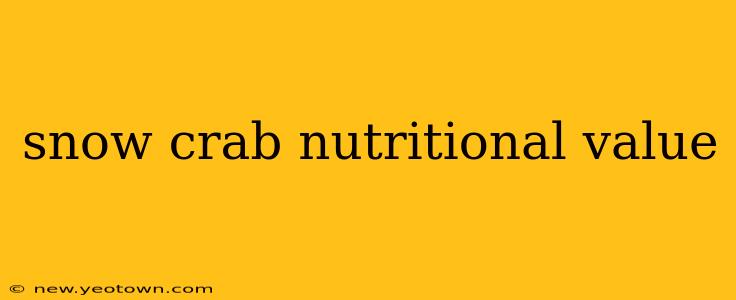The delicate sweetness of snow crab legs is a culinary delight, but beyond its exquisite taste lies a surprising nutritional powerhouse. This crustacean isn't just a fancy appetizer; it's a surprisingly healthy addition to your diet, packed with essential nutrients that benefit your overall well-being. Let's embark on a delicious journey to uncover the nutritional value of snow crab.
What are the Nutritional Benefits of Snow Crab?
Snow crab boasts a low-calorie profile, making it an ideal choice for those watching their weight. But the benefits extend far beyond simply being low-calorie. It's a fantastic source of lean protein, crucial for building and repairing tissues, supporting muscle growth, and maintaining a healthy metabolism. This protein is easily digestible, making it a great option for those with sensitive stomachs.
Beyond protein, snow crab offers a rich array of essential minerals. It's particularly high in selenium, a powerful antioxidant that protects your cells from damage, boosting your immune system and potentially reducing the risk of chronic diseases. It also contains a good amount of zinc, vital for immune function, wound healing, and cell growth. Other minerals present include copper, phosphorus, and magnesium, all contributing to overall health and well-being.
Is Snow Crab High in Cholesterol?
This is a question many people ask, given the reputation of shellfish. While snow crab does contain cholesterol, the amounts are relatively moderate compared to other seafood options. Moreover, the beneficial nutrients and the overall health profile of snow crab often outweigh any concerns about cholesterol, particularly for individuals who maintain a balanced diet and lifestyle. It's important to remember that dietary cholesterol's impact on blood cholesterol is less significant than previously thought. Consult your doctor or a registered dietitian for personalized advice regarding cholesterol intake.
How Does Snow Crab Compare to Other Seafood?
Compared to some other seafood, snow crab offers a unique nutritional profile. While it may not be as high in omega-3 fatty acids as some fatty fish like salmon, its lean protein and mineral content are standouts. It's a lighter option compared to richer shellfish like lobster, offering a more delicate flavor and a lower calorie count. The nutritional value differs slightly depending on preparation methods, but generally, snow crab remains a healthy and nutritious choice.
What are the potential health risks associated with eating snow crab?
Like all seafood, there’s a small risk of allergic reactions. Individuals with shellfish allergies should exercise caution and avoid consumption altogether. Furthermore, ensure the crab is sourced and handled properly to minimize the risk of foodborne illnesses. Choosing reputable suppliers and following safe food handling practices are crucial.
How much snow crab should I eat?
There’s no single magic number for snow crab consumption. As with any food, moderation is key. Incorporate it as part of a balanced diet that includes a variety of other nutrient-rich foods. Your individual needs may vary based on factors like age, activity level, and overall health. Consulting a registered dietitian or nutritionist can provide personalized guidance.
Is snow crab good for weight loss?
Due to its relatively low calorie and high protein content, snow crab can be a valuable part of a weight-loss diet. The protein helps keep you feeling full and satisfied, reducing cravings and potentially aiding in weight management. However, remember portion control is crucial, and snow crab should be part of a broader healthy eating plan for effective weight loss.
In conclusion, snow crab offers a delectable and nutritious experience. Its lean protein, essential minerals, and relatively low calorie count make it a valuable addition to a balanced diet. Remember to consider potential allergies and always practice safe food handling for a healthy and enjoyable culinary adventure.

